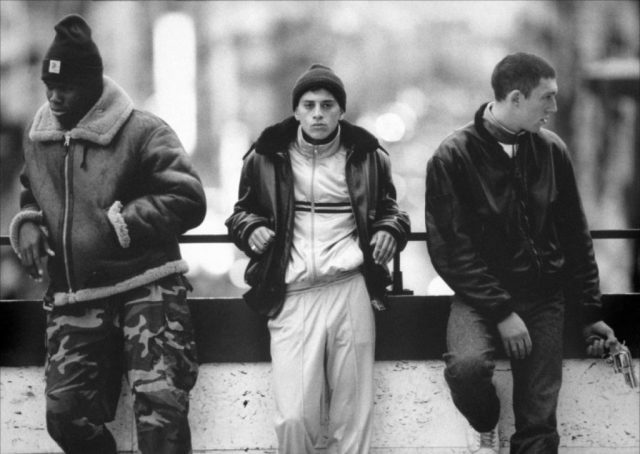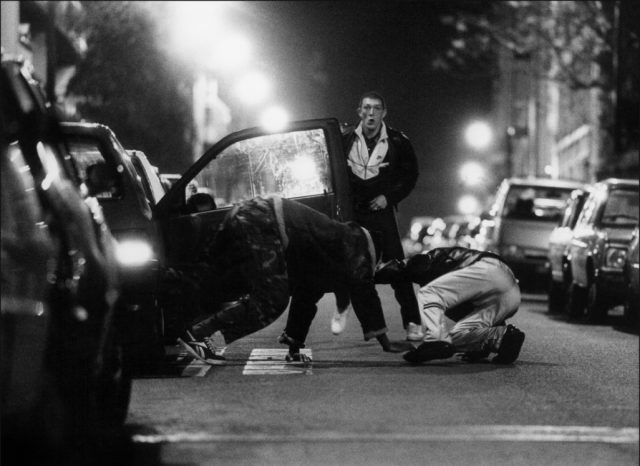
Hubert (Hubert Koundé), Saïd (Saïd Taghmaoui), and Vinz (Vincent Cassel) experience a wild and dangerous day in La haine
CURATOR’S CHOICE SCREENING: LA HAINE (HATE) (Mathieu Kassovitz, 1995)
BAMcinématek, BAM Rose Cinemas
30 Lafayette Ave. between Ashland Pl. & St. Felix St.
Wednesday, March 20, 7:30
Series runs March 20-28
718-636-4100
www.bam.org
www.canopycanopycanopy.com
 BAM and Triple Canopy, the New York–based online magazine, have teamed up to present the provocative film series “On Resentment,” which kicks off March 20 at 7:30 with Mathieu Kassovitz’s incendiary 1995 stunner, La haine, inspired by the real-life stories of Makome M’Bowole and Malik Oussekine, two young men who were killed by police in 1993 and 1986, respectively. Kassovitz’s second feature film (following Métisse), La haine, which means “hate,” is set in the immediate aftermath of Paris riots as three friends —the Jewish Vinz (Vincent Cassel), the Afro-French Hubert (Hubert Koundé), and the Arab Saïd (Saïd Taghmaoui) — spend about twenty hours wandering the mean streets of their banlieue (suburban projects) and Paris, causing minor mayhem as they encounter skinheads, stop off for some wine at an art opening, try to get into a hot club, and, over and over, become embroiled with the police.
BAM and Triple Canopy, the New York–based online magazine, have teamed up to present the provocative film series “On Resentment,” which kicks off March 20 at 7:30 with Mathieu Kassovitz’s incendiary 1995 stunner, La haine, inspired by the real-life stories of Makome M’Bowole and Malik Oussekine, two young men who were killed by police in 1993 and 1986, respectively. Kassovitz’s second feature film (following Métisse), La haine, which means “hate,” is set in the immediate aftermath of Paris riots as three friends —the Jewish Vinz (Vincent Cassel), the Afro-French Hubert (Hubert Koundé), and the Arab Saïd (Saïd Taghmaoui) — spend about twenty hours wandering the mean streets of their banlieue (suburban projects) and Paris, causing minor mayhem as they encounter skinheads, stop off for some wine at an art opening, try to get into a hot club, and, over and over, become embroiled with the police.
The disaffected youths are fed up with a system that continues to treat them as outsiders, assuming they are criminals. Hubert wants to get out of the banlieue through hard work, but he keeps running into obstacles that are out of his control; at one point, when something goes wrong, he closes his eyes as if he can wish it away. Saïd is an immature schemer who thinks he can slide out of any untoward situation, especially with the help of his much more grounded older brother. But Vinz is a significant problem; one of their friends, Abdel (Abdel Ahmed Ghili), was arrested at the riots and has been severely injured while in police custody. Vinz has sworn to kill a policeman if Abdel dies, something that becomes more possible when he picks up a gun an officer dropped. “I’m fuckin’ sick of the goddam system!” Vinz proclaims, filled with resentment. The three young men pass by a few signs that say “The World Is Yours,” a reference to Scarface, but that seems far out of reach for them.

Vinz (Vincent Cassel) sees trouble coming in Mathieu Kassovitz’s explosive La haine
Photographed in gritty black-and-white by Pierre Aïm and edited with a caged fury by Kassovitz and Scott Stevenson, La haine is electrifying cinema, a powder keg of a film ready to explode at any second. The time is shown onscreen before each scene, going from 10:38 to 06:00, like a ticking time bomb. The film has a documentary-like quality, complete with actual news footage of riots and violence. Kassovitz shows up as a skinhead, while his father, director and writer Peter Kassovitz, is a patron at the art gallery. The soundtrack features songs by French hip-hoppers Assassin; Cassel’s brother, Mathias Crochon, is a member of the group. And look for French star Vincent Lindon’s riotous cameo as a very drunk man.
Several times Vinz appears to be looking straight into the camera, pointing his gun accusingly at the audience; his complete disdain for all types of authority is reckless and dangerous but also understandable, and Kassovitz is extending that rage beyond the screen. In fact, during the November 2005 riots in France, people looked to Kassovitz for a response, and the writer-actor-director eventually got into a blog battle with Minister of the Interior Nicolas Sarkozy, who would later become prime minister. Kassovitz wrote, “As much as I would like to distance myself from politics, it is difficult to remain distant in the face of the depravations of politicians. And when these depravations draw the hate of all youth, I have to restrain myself from encouraging the rioters.” Sarkozy replied, “You seem to be acquainted with the suburbs well enough to know, deep inside you, that the situation has been tense there for many years and that the unrest is deep-rooted. Your film La haine, shot in 1995, already showed this unease that right-wing and left-wing governments had to deal with, with varying results. To claim this crisis is down to the Minister of the Interior’s sayings and doings is yet another way of missing the point. I attributed this to an untimely and quick-tempered reaction.”
The BAM/Triple Canopy series is a nine-day program of films that focus on the concept of resentment as it applies to politics, identity, and representation, asking such questions as “How can resentment be reclaimed by those who are used to fits of anger and bitterness being called unproductive, petty, selfish, even pathological?” and “Can — and must — resentment be useful?” The Curator’s Choice screening of La haine will be followed by a discussion with artist and writer Maryam Monalisa Gharavi, series programmer Ashley Clark, and Triple Canopy editor Emily Wang, who cowrote the TC article “A Note on Resentment” with Shen Goodman, which states, “We’re proposing to hold on to resentment not so much as a means of plotting the downfall of our enemies — though why not, it is the resentment issue — but as a starting point for thinking and making and belonging. . . . Who, if anyone, has a right to be resentful? How can resentment be useful? (Must resentment be useful?)” And of course, the film is relevant yet again in light of the Yellow Vest protests held earlier this year in Paris and the many people of color shot by police or who die in custody under questionable, controversial circumstances here in America. The series continues through March 28 with such other films as Haskell Wexler’s Medium Cool, Michelangelo Antonioni’s Zabriskie Point, Asghar Farhadi’s A Separation, Lindsay Anderson’s If . . . , and John Akomfrah’s Handsworth Songs.